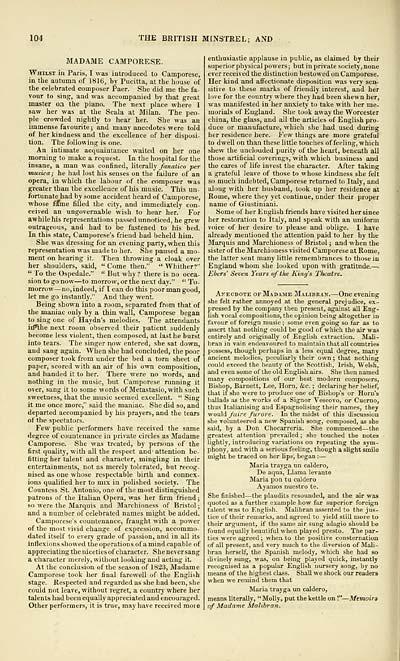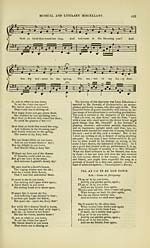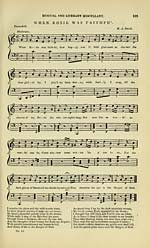Glen Collection of printed music > Printed music > British minstrel, and musical and literary miscellany
(112) Page 104
Download files
Complete book:
Individual page:
Thumbnail gallery: Grid view | List view

104
THE BRITISH MINSTREL; AND
MADAME CAMPORESE.
Whilst in Paris, I was introduced to Camporese,
in the autumn of 1816, by Pucitta, at the house of
the celebrated composer Paer. She did me the fa-
vour to sing, and was accompanied by that great
master oa the piano. The next place where I
saw her was at the Scala at Milan. The peo-
ple crowded nightly to hear her. She was an
immense favourite ; and many anecdotes were told
of her kindness and the excellence of her disposi-
tion. The following is one.
An intimate acquaintance waited on her one
morning to make a request. In the hospital for the
insane, a man was confined, literally fanatico per
musica ; he had lost his senses on the failure of an
opera, in which the labour of the composer was
greater than the excellence of his music. This un-
fortunate had by some accident heard of Camporese,
whose time filled the city, and immediately con-
ceived an ungovernable wish to hear her. For
awhile his representations passed unnoticed, he grew
outrageous, and had to be fastened to his bed.
In this state, Camporese's friend had beheld him.
She was dressing for an evening party, when this
representation was made to her. She paused a mo-
ment on hearing it. Then throwing a cloak over
her shoulders, said, "Come then." "Whither?"
" To the Ospedale." " But why ? there is no occa-
sion to go now — to morrow, or the next day." " To-
morrow — no, indeed, if I can do this poor man good,
let me go instantly." And they went.
Being shown into a room, separated from that of
the maniac only by a thin wall, Camporese began
to sing one of Haydn's melodies. The attendants
iif*the next room observed their patient suddenly
become less violent, then composed, at last he burst
into tears. The singer now entered, she sat down,
and sang again. When she had concluded, the poor
composer took from under the bed a torn sheet of
paper, scored with an air of his own composition,
and handed it to her. There were no words, and
nothing in the music, but Camporese running it
over, sang it to some words of Metastasio, with such
sweetness, that the music seemed excellent. " Sing
it me once more," said the maniac. She did so, and
departed accompanied by his prayers, and the tears
of the spectators.
Few public performers have received the same
degree of countenance in private circles as Madame
Camporese. She was treated, by persons of the
first quality, with all the respect and attention be-
iitting her talent and character, mingling in their
entertainments, not as merely tolerated, but recog-
nised as one whose respectable birth and connex-
ions qualified her to mix in polished society. The
Countess St. Antonio, one of the most distinguished
patrons of the Italian Opera, was her firm friend ;
so were the Marquis and Blarchioness of Bristol ;
and a number of celebrated names might be added.
Camporese's countenance, fraught with a power
of the most vivid change of expression, accommo-
dated itself to every grade of passion, and in all its
inflexions showed the operations of a mind capable of
appreciating the niceties of character. Sheneversang
a character merely, without looking and acting it.
At the conclusion of the season of 1823, Madame
Camporese took her final farewell of the English
stage. Respected and regarded as she had been, she
could not leave, without regret, a country where her
talents had been equally appreciated and encouraged .
Other performers, it is true, may have received more
enthusiastic applause in public, as claimed by their
superior physical powers ; but in private society, none
ever received the distinction bestowed on Camporese.
Her kind and afl'ectionate disposition was very sen-
sitive to these marks of friendly interest, and her
love for the country where they had been shewn her,
was manifested in her anxiety to take with her me-
morials of England. She took away the Worcester
china, the glass, and all the articles of English pro-
duce or manufacture, which she had used during
her residence here. Few things are more grateful
to dwell on than these little touches of feeling, which
shew the unclouded purity of the heait, beneath all
those artificial coverings, with which business and
the cares of life invest the character. After taking
a grateful leave of those to whose kindness she felt
so much indebted, Camporese returned to Italy, and
along with her husband, took up her residence at
Rome, where they yet continue, under their proper
name of Giustiniani.
Some of her English friends have visited her since
her restoration to Italy, and speak with an uniform
voice of her desire to please and oblige. I have
already mentioned the attention paid to her by the
Marquis and Marchioness of Bristol ; and when the
sister of the Marchioness visited Camporese at Rome,
the latter sent many little remembrances to those in
England whom she looked upon with gratitude. — .
Ebers' Seven Years o/tlte Kiny's Theatre.
Akecdote of Madame Malibran. — One evening
she felt rather annoyed at the general prejudice, ex-
Eressed by the company then present, against all Eng-
sh vocal compositions, the opinion being altogether in
favour of foreign music ; some even going so far as to
assert that nothing could be good of which the air wa.s
entirely and originally of English extraction. Mali-
bran in vain endeavoured to maintain that all countries
possess, though perhaps in a less equal degree^ many
ancient melodies, peculiarly their own ; that nothing
could exceed the beauty of the Scottish, Irish, Welsh,
and even some of the old English airs. She then named
many compositions of our best modern composers.
Bishop, Barnett, Lee, Horn, &c. ; declaring her belief,
that if she were to produce one of Bishop's or Horn's
ballads ;ls the works of a Signor Vescovo, or Cuerno,
thus Italianising and Espagnolising their names, they
would faire furore. In the midst of this discussion
she volunteered a new Spanish song, composed, as she
said, by a Don Chocarreria. She commenced — the
greatest attention prevailed ; she touched the notes
lightly, introducing variations on repeating the sym-
phony, and with a serious feeling, though a slight smile
might be traced on her lips, began : —
Maria trayga nn caldero,
De aqua. Llama levante
Maria pon tu caldero
Ayamos nuestro te.
She iinished — the plaudits resounded, and the air was
quoted as a further example how far superior foreign
talent was to English. Malibran assented to the jus-
tice of their remarks, and agreed to yield still more to
their argument, if the same air sung adagio should be
found equally beautiful when played presto. The par-
ties were agreed; when to the positive consternation
of all present, and very much to the diversion of Mali-
bran herself, the Spanish melody, which she had so
divinely sung, was, on being played quick, instantly
recognised as a popular English nursery song, by no
means of the highest class. Shall we shock our readers
when we remind them that
Maria trayga un caldero,
means literally, " Molly, put the kettle on !" — Memoirs
of Madame Malibran,
THE BRITISH MINSTREL; AND
MADAME CAMPORESE.
Whilst in Paris, I was introduced to Camporese,
in the autumn of 1816, by Pucitta, at the house of
the celebrated composer Paer. She did me the fa-
vour to sing, and was accompanied by that great
master oa the piano. The next place where I
saw her was at the Scala at Milan. The peo-
ple crowded nightly to hear her. She was an
immense favourite ; and many anecdotes were told
of her kindness and the excellence of her disposi-
tion. The following is one.
An intimate acquaintance waited on her one
morning to make a request. In the hospital for the
insane, a man was confined, literally fanatico per
musica ; he had lost his senses on the failure of an
opera, in which the labour of the composer was
greater than the excellence of his music. This un-
fortunate had by some accident heard of Camporese,
whose time filled the city, and immediately con-
ceived an ungovernable wish to hear her. For
awhile his representations passed unnoticed, he grew
outrageous, and had to be fastened to his bed.
In this state, Camporese's friend had beheld him.
She was dressing for an evening party, when this
representation was made to her. She paused a mo-
ment on hearing it. Then throwing a cloak over
her shoulders, said, "Come then." "Whither?"
" To the Ospedale." " But why ? there is no occa-
sion to go now — to morrow, or the next day." " To-
morrow — no, indeed, if I can do this poor man good,
let me go instantly." And they went.
Being shown into a room, separated from that of
the maniac only by a thin wall, Camporese began
to sing one of Haydn's melodies. The attendants
iif*the next room observed their patient suddenly
become less violent, then composed, at last he burst
into tears. The singer now entered, she sat down,
and sang again. When she had concluded, the poor
composer took from under the bed a torn sheet of
paper, scored with an air of his own composition,
and handed it to her. There were no words, and
nothing in the music, but Camporese running it
over, sang it to some words of Metastasio, with such
sweetness, that the music seemed excellent. " Sing
it me once more," said the maniac. She did so, and
departed accompanied by his prayers, and the tears
of the spectators.
Few public performers have received the same
degree of countenance in private circles as Madame
Camporese. She was treated, by persons of the
first quality, with all the respect and attention be-
iitting her talent and character, mingling in their
entertainments, not as merely tolerated, but recog-
nised as one whose respectable birth and connex-
ions qualified her to mix in polished society. The
Countess St. Antonio, one of the most distinguished
patrons of the Italian Opera, was her firm friend ;
so were the Marquis and Blarchioness of Bristol ;
and a number of celebrated names might be added.
Camporese's countenance, fraught with a power
of the most vivid change of expression, accommo-
dated itself to every grade of passion, and in all its
inflexions showed the operations of a mind capable of
appreciating the niceties of character. Sheneversang
a character merely, without looking and acting it.
At the conclusion of the season of 1823, Madame
Camporese took her final farewell of the English
stage. Respected and regarded as she had been, she
could not leave, without regret, a country where her
talents had been equally appreciated and encouraged .
Other performers, it is true, may have received more
enthusiastic applause in public, as claimed by their
superior physical powers ; but in private society, none
ever received the distinction bestowed on Camporese.
Her kind and afl'ectionate disposition was very sen-
sitive to these marks of friendly interest, and her
love for the country where they had been shewn her,
was manifested in her anxiety to take with her me-
morials of England. She took away the Worcester
china, the glass, and all the articles of English pro-
duce or manufacture, which she had used during
her residence here. Few things are more grateful
to dwell on than these little touches of feeling, which
shew the unclouded purity of the heait, beneath all
those artificial coverings, with which business and
the cares of life invest the character. After taking
a grateful leave of those to whose kindness she felt
so much indebted, Camporese returned to Italy, and
along with her husband, took up her residence at
Rome, where they yet continue, under their proper
name of Giustiniani.
Some of her English friends have visited her since
her restoration to Italy, and speak with an uniform
voice of her desire to please and oblige. I have
already mentioned the attention paid to her by the
Marquis and Marchioness of Bristol ; and when the
sister of the Marchioness visited Camporese at Rome,
the latter sent many little remembrances to those in
England whom she looked upon with gratitude. — .
Ebers' Seven Years o/tlte Kiny's Theatre.
Akecdote of Madame Malibran. — One evening
she felt rather annoyed at the general prejudice, ex-
Eressed by the company then present, against all Eng-
sh vocal compositions, the opinion being altogether in
favour of foreign music ; some even going so far as to
assert that nothing could be good of which the air wa.s
entirely and originally of English extraction. Mali-
bran in vain endeavoured to maintain that all countries
possess, though perhaps in a less equal degree^ many
ancient melodies, peculiarly their own ; that nothing
could exceed the beauty of the Scottish, Irish, Welsh,
and even some of the old English airs. She then named
many compositions of our best modern composers.
Bishop, Barnett, Lee, Horn, &c. ; declaring her belief,
that if she were to produce one of Bishop's or Horn's
ballads ;ls the works of a Signor Vescovo, or Cuerno,
thus Italianising and Espagnolising their names, they
would faire furore. In the midst of this discussion
she volunteered a new Spanish song, composed, as she
said, by a Don Chocarreria. She commenced — the
greatest attention prevailed ; she touched the notes
lightly, introducing variations on repeating the sym-
phony, and with a serious feeling, though a slight smile
might be traced on her lips, began : —
Maria trayga nn caldero,
De aqua. Llama levante
Maria pon tu caldero
Ayamos nuestro te.
She iinished — the plaudits resounded, and the air was
quoted as a further example how far superior foreign
talent was to English. Malibran assented to the jus-
tice of their remarks, and agreed to yield still more to
their argument, if the same air sung adagio should be
found equally beautiful when played presto. The par-
ties were agreed; when to the positive consternation
of all present, and very much to the diversion of Mali-
bran herself, the Spanish melody, which she had so
divinely sung, was, on being played quick, instantly
recognised as a popular English nursery song, by no
means of the highest class. Shall we shock our readers
when we remind them that
Maria trayga un caldero,
means literally, " Molly, put the kettle on !" — Memoirs
of Madame Malibran,
Set display mode to: Large image | Transcription
Images and transcriptions on this page, including medium image downloads, may be used under the Creative Commons Attribution 4.0 International Licence unless otherwise stated. ![]()
| Special collections of printed music > Glen Collection of printed music > Printed music > British minstrel, and musical and literary miscellany > (112) Page 104 |
|---|
| Permanent URL | https://digital.nls.uk/91436289 |
|---|
| Description | Scottish songs and music of the 18th and early 19th centuries, including music for the Highland bagpipe. These are selected items from the collection of John Glen (1833 to 1904). Also includes a few manuscripts, some treatises, and other books on the subject. |
|---|
| Description | The Glen Collection and the Inglis Collection represent mainly 18th and 19th century Scottish music, including Scottish songs. The collections of Berlioz and Verdi collected by bibliographer Cecil Hopkinson contain contemporary and later editions of the works of the two composers Berlioz and Verdi. |
|---|

